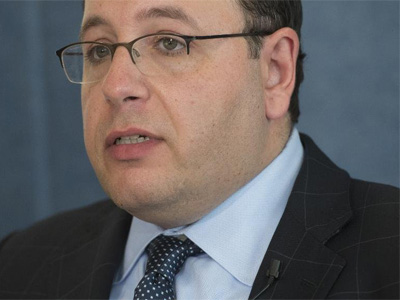
A Washington Post reporter detained in Iran will be tried for espionage and collaborating with “hostile governments”, his lawyer told AFP Monday, insisting there is “no justifiable proof” against him.
Jason Rezaian, the newspaper’s Tehran correspondent, has been in jail for nine months on what has become a politically sensitive case given ongoing nuclear talks between Iran and the West.
His employer denounced the charges as absurd and ludicrous.
In a telephone call after meeting him, the reporter’s lawyer Leila Ahsan said her client also stands accused of gathering classified information and disseminating propaganda against the Islamic Republic of Iran.
But no date has yet been set for trial, Ahsan said, revealing the charges in the case against Rezaian, who holds both American and Iranian nationality, for the first time.
Ahsan spoke to AFP shortly after a senior judicial official said the file against the 39-year-old journalist was “thick” and that it has been sent to a revolutionary court — which handles questions of national security — where he will face the allegations.
However Ahsan said: “Jason is a journalist and the nature of his work is to have access to information and to publish it. He had no access to confidential information, either directly or indirectly.”
Rezaian was detained in Tehran on July 22 last year, along with his Iranian wife Yeganeh Salehi who was released on bail after spending two-and-a-half months in custody.
Rezaian is being held in the capital’s notorious Evin Prison. Ahsan said he was “in good spirits” but had no access to newspapers or media, which had caused him some difficulties.
Rezaian’s family have frequently spoken of their fears for his health, citing his need for medication to combat high blood pressure.
His mother Mary told AFP she had discussed the charges with the journalist’s wife, who remains in Tehran, but had no further comment.
‘No link’ to nuclear talks –
The reporter’s detention has political resonance both because of his dual nationality and the long-running talks between Iran and world powers, including the United States, regarding Tehran’s disputed nuclear programme.
Foreign Minister Mohammad Javad Zarif last week said the charges against Rezaian were “very serious” and were a matter for Iran’s judiciary, insisting the case was free of political interference.
Ahsan also said the allegations against her client “had no link” with the nuclear talks, but added: “I hope this matter will accelerate the liberation of my client.”
In a rare official comment on the accusations against Rezaian, Gholamhossein Esmaili, Tehran’s judiciary chief, said Monday: “The file is thick and contains different aspects.”
Quoted by the official IRNA news agency, he added: “There are numerous cases in hand at the revolutionary court. In due course the judgment will be pronounced.”
The court’s sessions are held behind closed doors.
The Post has accused Iran of thwarting Rezaian’s access to legal counsel.
In a statement, the newspaper’s executive editor Martin Baron said: “The grave charges against Jason that Iran has now disclosed could not be more ludicrous.
“It is absurd and despicable to assert, as Iran’s judiciary is now claiming, that Jason’s work first as a freelance reporter and then as The Post’s Tehran correspondent amounted to espionage.”
Rezaian was among four US citizens that President Barack Obama last month urged Iran to return home.
On April 2, Iran and world powers agreed the key parameters for a deal that would end a 12-year standoff about concerns that Iran is seeking a nuclear bomb.
A final agreement is due by the end of June.
Iran insists its atomic programme is entirely peaceful and meant for civilian energy purposes only.



